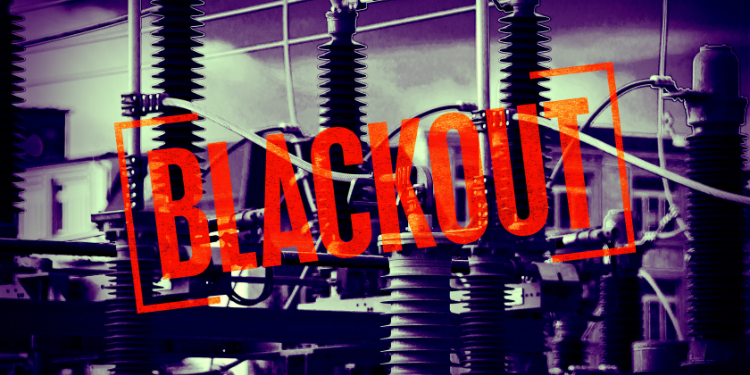Blackouts have a way of sneaking up on us. One minute you’re binge-watching your favorite show, and the next—bam—the power is gone, and you’re plunged into darkness. While these outages can be brief, sometimes they drag on for days. The question is, are you ready for an extended blackout?
The good news is that you don’t need a warehouse full of gear to prepare effectively. With some quick and practical steps, you can be ready for whatever comes next. Let’s look at how to prepare yourself and your family before the next big blackout hits.
Step 1: Set Up Alternative Lighting Sources
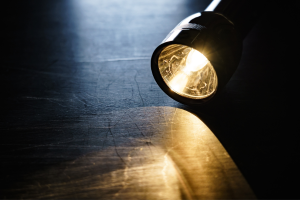 One of the first things that hits you when the power goes out is the darkness. Whether it’s night or just a sunny, cloudless day, losing the lights can be disorienting, and even dangerous. Having a reliable source of light is critical not just for comfort, but for keeping your family and property safe.
One of the first things that hits you when the power goes out is the darkness. Whether it’s night or just a sunny, cloudless day, losing the lights can be disorienting, and even dangerous. Having a reliable source of light is critical not just for comfort, but for keeping your family and property safe.
Imagine trying to navigate your home in pitch black or needing to handle an emergency without proper lighting. To make sure you aren’t fumbling around in the dark, it’s vital to set up alternative lighting sources now before the power goes out.
- Flashlights and Lanterns: Every family member should have access to a working flashlight. Keep flashlights in multiple locations around the house, including on nightstands, the kitchen drawer, and the garage, so they’re easy to grab. LED lanterns are great for lighting up entire rooms and, unlike candles, they’re safer for households with pets or children.
- Headlamps: If you need to get things done during an outage, a headlamp can be a lifesaver. It leaves your hands free, which is perfect for cooking, fixing broken items, or even just reading a book.
- Solar and Hand-Crank Lights: Invest in solar-powered or hand-crank lights. These won’t run out of power like the battery-powered options, making them ideal for extended outages. Just make sure they’re charged up prior to the blackout, or easy to crank even in emergency situations.
- Generate Your Own Power: There are a lot of store-bought generators on the market, but your best option is to make one yourself, using this blueprint. The great thing about this DIY power plant is that you can produce as much electricity as you need, no less, no more.
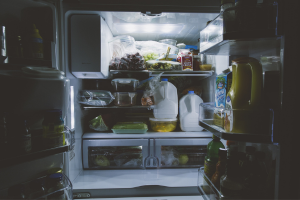 Keeping your food from spoiling during a blackout can be challenging, but with a little planning, you can make it work. When the power goes out, one of the biggest concerns is how to keep your food fresh. Without refrigeration, perishables can go bad quickly, leading to waste and potential food shortages.
Keeping your food from spoiling during a blackout can be challenging, but with a little planning, you can make it work. When the power goes out, one of the biggest concerns is how to keep your food fresh. Without refrigeration, perishables can go bad quickly, leading to waste and potential food shortages.
By taking these simple steps in advance, you can extend the life of your food and ensure your family has enough to eat. Here are some strategies to preserve your food when the refrigerator goes silent:
- Keep Your Fridge and Freezer Closed: The less you open your fridge, the longer your food will stay cold. A full freezer can keep food frozen for up to 48 hours, while a half-full one can last about 24 hours. If you fear a blackout is looming, consider consolidating your freezer contents to one location to help maintain the cold longer.
- Freeze Water Containers: Fill empty soda bottles or plastic containers with water and freeze them. These ice packs will help keep your freezer cold longer and can also be used to chill items in a cooler if needed.
- Dry Goods and Non-Perishables: Stock up on canned goods, pasta, rice, and other non-perishables that don’t require refrigeration. Remember to have a manual can opener handy; nothing’s more frustrating than having plenty of canned food but no way to open and consume it.
- Alternative Cooking Methods: During an extended blackout, your electric stove or microwave won’t do you any good. A propane camp stove or charcoal grill is a great backup option for cooking meals. Just make sure to use them outdoors and away from windows to avoid carbon monoxide poisoning.
- Make an Electricity Free Fridge: You don’t need any power to keep your food from spoiling. This off-grid fridge will preserve meat, milk, eggs, cheese and anything else you need even when it’s over 100 degrees outside.
Step 3: Secure a Backup Water Supply
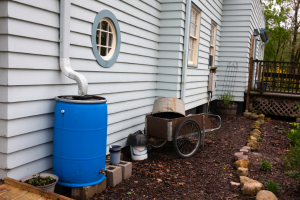 When the power goes out, water may stop flowing, especially if you rely on an electric well pump. Water is one of the most critical resources you need during any SHTF scenario. Without it, cooking, cleaning, and even staying hydrated becomes impossible. That’s why it’s crucial to have a plan for securing a backup water supply.
When the power goes out, water may stop flowing, especially if you rely on an electric well pump. Water is one of the most critical resources you need during any SHTF scenario. Without it, cooking, cleaning, and even staying hydrated becomes impossible. That’s why it’s crucial to have a plan for securing a backup water supply.
- Fill Up Your Bathtub: If you have advance warning of a blackout—like during a storm—fill up your bathtub with water. This water can be used for flushing toilets, cleaning, or even drinking if properly filtered.
- Water Storage Containers: Keep several gallons of water stored in a cool, dark place. The general rule is to store one gallon per person per day for at least three days. Don’t forget about pets—they’ll need water too. Don’t forget about stockpiling water. Here is how you can build your own pressurized rainwater collection system.
- Water Filtration: Consider investing in a portable water filter or purification tablets. If your water supply is interrupted for an extended period, you may need to purify natural water sources like streams or lakes.
Step 4: Maintain Communication Without Electricity
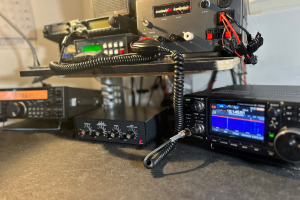 Staying informed during a blackout can make a huge difference. Whether it’s receiving updates on the situation or communicating with loved ones, maintaining some level of communication is key.
Staying informed during a blackout can make a huge difference. Whether it’s receiving updates on the situation or communicating with loved ones, maintaining some level of communication is key.
When the power goes out, your usual means of staying connected, such as the internet and your cell phone, won’t be available. That’s why it’s important to have backup communication options that don’t rely on electricity.
- Battery-Powered or Hand-Crank Radio: A reliable radio is essential for receiving emergency broadcasts. Look for one that can run on both batteries and solar or hand-crank power.
- Charge Your Devices: When a blackout is imminent, plug in all your essential devices and top off their charge. Portable power banks are also a good investment. Make sure they’re fully charged so you can keep your phone running for longer.
- Walkie-Talkies: If the cell network goes down, walkie-talkies can be an invaluable way to communicate with family members nearby. They’re also useful for checking in with neighbors.
Step 5: Heating and Cooling Solutions
Depending on the time of year, a blackout can leave you sweltering in the heat or shivering in the cold. Temperature control is more than just a matter of comfort, it can be a matter of survival. Extreme heat or cold can pose serious health risks, especially for young children and the elderly. It’s important to have heating and cooling solutions in place to keep your family safe and comfortable during an extended power outage.
Related: The First Thing You Should Do in a Winter Blackout
- Staying Warm: If it’s winter, make sure you have plenty of blankets, sleeping bags, and warm clothing. Portable propane heaters are an option, but they need to be used carefully and only in well-ventilated areas.
- Keeping Cool: During a summer outage, stay hydrated and keep shades drawn to block out the sun. Battery-powered fans can help, as can damp towels draped over your body or a cool shower. If you have a basement, consider staying down there—it’s usually cooler than the rest of the house.
Step 6: First Aid and Basic Medical Supplies
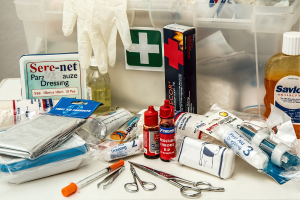 A blackout can complicate an already stressful situation if someone gets hurt.
A blackout can complicate an already stressful situation if someone gets hurt.
Accidents can happen at any time, and without power, even a minor injury can become a major problem.
That’s why having a well-stocked first aid kit is crucial during a blackout. With the right supplies, you can handle minor medical issues and provide care until professional help is available.
- First Aid Kit: Make sure your kit includes bandages, antiseptic wipes, adhesive tape, pain relievers, and any prescription medications that your family may need.
- Backup Power for Medical Devices: If anyone in your household relies on a medical device that requires electricity, you need a backup plan. This could be a portable battery pack or a generator, but whatever you choose, make sure it’s charged and ready to go.
- Your at-home apothecary: Start making your own natural remedies that will help you and family not just in a major blackout, but also in another crisis, when the pharmacies will get looted, and the hospitals the first to become overcrowded. If you don’t know where to begin, there is this guide, written by Dr. Nicole Apelian, that shows you step-by-step how to create the remedies that could become your crisis-proof lifeline.
Step 7: Personal Security Measures
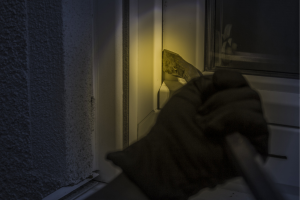 Extended blackouts can lead to increased security concerns, especially if they last several days. In times of crisis, people may become desperate, and security can become a real concern. Taking steps to secure your home can provide peace of mind and help ensure the safety of your family and your property during a prolonged outage.
Extended blackouts can lead to increased security concerns, especially if they last several days. In times of crisis, people may become desperate, and security can become a real concern. Taking steps to secure your home can provide peace of mind and help ensure the safety of your family and your property during a prolonged outage.
- Lock Doors and Windows: Make sure all entry points to your home are locked and secured. If you have outdoor solar lighting, use it to keep key areas of your property lit at night.
- Know Your Neighbors: In times of crisis, having a network of trusted neighbors can be a huge asset. Check in on each other, share resources if needed, and keep an eye out for anything unusual.
Step 8: Keep Yourself Entertained
A blackout can be boring, especially for kids, so having a plan to keep everyone entertained can make the experience much more manageable. Without power, there’s no TV, internet, or video games, which can make the hours drag on. Keeping yourself and your family entertained is important for maintaining morale and reducing stress during an extended outage.
- Board Games and Books: Stock up on board games, puzzles, and books to help pass the time. They don’t require any electricity and can keep both kids and adults entertained for hours.
- Crafts and Activities: Have some arts and crafts supplies on hand. Drawing, knitting, or even building models can help take your mind off the situation.
Related: The Upcoming US Blackout: What To Do Before It’s Too Late
Quick Action Checklist
When the lights suddenly go out, it can be easy to forget what needs to be done. Here’s a quick action checklist to help you stay on track. Print it out and put it in a visible place:
- Grab Flashlights: Ensure everyone has access to a flashlight or lantern.
- Fill Up Water Containers: Fill up your bathtub and any available containers with water.
- Charge Devices: Plug in all essential devices and portable power banks.
- Check Food Supplies: Keep the fridge closed, and gather dry goods and non-perishables.
- Lock Up: Secure all doors and windows, and activate any outdoor solar lights.
- Stay Informed: Turn on your battery-powered or hand-crank radio for updates.
By taking these steps now, you can make sure you’re prepared before the next blackout strikes. Remember, preparedness isn’t about fear—it’s about taking control of your situation and ensuring your family is safe, comfortable, and ready for whatever comes your way. With a little planning and the right supplies, you can turn a stressful blackout into just another minor inconvenience.
You may also like:
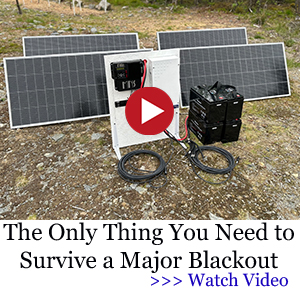 Better Than Walmart: Stores To Get Survival Foods For a Bargain
Better Than Walmart: Stores To Get Survival Foods For a Bargain
How to Avoid Being Targeted by Looters During a Massive Blackout (Video)
The Best States To Live In When A Pandemic Strikes
9 Natural Remedies that People with Diabetes Will Find Useful
DIY EMP-Proof Truck
Read the full article here

